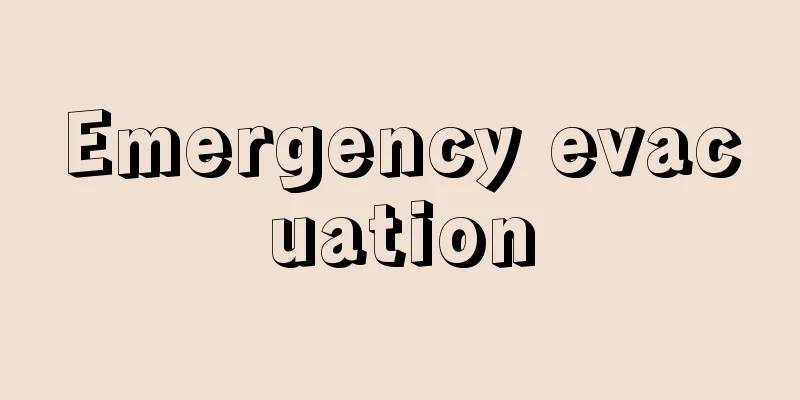Emergency evacuation

|
Legally, it is an unavoidable act to avoid imminent danger, and is regulated in both the Criminal Code and the Civil Code. [Haruo Nishihara] Criminal LawIt refers to an act (act of emergency evacuation) that is unavoidably performed to avoid a current danger (an urgent and dangerous situation) to the life, body, freedom, or property of oneself or another person (for others, the term emergency rescue is also used). Even if it falls under criminal law, it is "not punishable" (Article 37, Paragraph 1 of the Penal Code), in other words, it is not considered a crime and therefore no criminal punishment is imposed. However, it is necessary that the harm caused by the act of emergency evacuation does not exceed the degree of harm that was intended to be avoided. This is called the principle of proportionality of emergency evacuation or the balance of legal interests. When an act of evacuation is performed more than necessary or when the principle of balance of legal interests is violated, it is called excessive evacuation, and since it is no longer an emergency evacuation, it is a crime, but the punishment may be reduced or waived depending on the circumstances (Article 37, Paragraph 1, proviso of the Penal Code). The question is what cases are not punishable as emergency evacuation, and it is necessary to consider two aspects: the aspect of danger and the aspect of evacuation. (1) The aspect of danger is the presence of a current danger to one's own or another person's life, body, freedom, or property. Some scholars believe that emergency evacuation (called extralegal emergency evacuation) should also be recognized for honor and chastity. A current danger refers to an imminent and dangerous state of infringement of legal interests (interests protected by law, such as life), regardless of the cause, whether it is caused by human actions, natural phenomena, or animals or objects. (2) The aspect of escape refers to an unavoidable act of escape (however, it goes without saying that it must not violate the principle of balance of legal interests). An act that is unavoidable means that it is the only best way to protect one's own or another person's legal interests (there is no other way to do it). The Criminal Code uses the same term for self-defense, but it is interpreted more strictly in the case of an emergency escape. This is called the supplementary nature of an emergency escape. If the above requirements are met, an act of emergency evacuation is established. However, the fact that it is not punishable as an act of emergency evacuation is a matter of criminal law, and as will be explained later, liability for damages is still recognized under civil law. Furthermore, those who have special duties in the course of their work, such as police officers, firefighters, and doctors, are not permitted to act in an emergency evacuation (Article 37, Paragraph 2 of the Criminal Code). This concept of emergency escape is a concept that developed later than self-defense. Roman law, German Temple Law (which recognized the principle that "necessity has no law"), and the Carolina Criminal Code (also called the Carolina Code, enacted in 1532) only had provisions that made emergency escape illegal in some cases of crime. The French Criminal Code of 1810 also made it illegal only in cases of psychological coercion, and Japan's old Criminal Code of 1880 (Meiji 13), which was modeled after the French Criminal Code, only expanded this slightly. It was only with the German Criminal Code of 1871 that emergency escape has been recognized in such a wide range as it is today, and in Japan it was only after the current Criminal Code, which was modeled after the German Criminal Code. [Haruo Nishihara] Civil CodeUnder the Civil Code, if one is forced to damage another person's property in order to avoid imminent danger arising from that property, one is exempt from liability for damages in tort (Civil Code Article 720, Paragraph 2). For example, if one is attacked by another person's dog and is forced to injure it, this would be an example of this. Under certain conditions, the illegality is precluded and it is not considered a tort. Compared to the criminal law, it differs in that (1) the danger must have been caused by the property of another person, and (2) liability is only released when the very property that caused the danger is damaged (in the example above, this does not include breaking a fence to keep a dog out). As with self-defense, the requirements for release from liability are that there was no other way, and that there is not a large disproportion between the interest protected and the damage caused by the damage to the property. [Takahisa Awaji] International LawIn international law, it is also known as the right of emergency. It refers to an unavoidable defensive action taken when there is imminent or actual harm due to a situation not based on the illegal acts of another country, and it is not possible to avoid it by other means. In a broad sense, it is included in the concept of the right of self-defense, but whereas the right of self-defense in the narrow sense is against illegal invasions by other countries, the right of emergency is different in that it is not against illegal acts by other countries. When a state of emergency is established, the illegality of the defensive action is precluded, and it becomes a lawful act under international law. However, compensation must naturally be paid for any damage caused by a state of emergency. There is debate as to whether this right is recognized under international law, but the majority view accepts it. Examples of emergency evacuations include the Danish fleet handover incident in 1807 during the Napoleonic Wars and the Oran incident during World War II. In the former, Napoleon tried to use the Danish fleet to invade Britain, but when Britain found out, it took the initiative and demanded that Denmark leave its fleet with Britain until the end of the war, but Denmark refused, so Britain sent a powerful fleet to capture the Danish fleet. In the latter Oran incident, in 1940, after the French fleet had surrendered to Germany during World War II and was retreating to the port of Oran in Algeria, Britain demanded that the French fleet surrender or disarm, and when the French fleet refused, Britain attacked and destroyed it. [Ikeda Fumio] [Reference] |Source: Shogakukan Encyclopedia Nipponica About Encyclopedia Nipponica Information | Legend |
|
法律上、急迫の危難を避けるためやむをえず行う行為で、刑法、民法にそれぞれ規定が置かれている。 [西原春夫] 刑法自己または他人(他人については、緊急救助の語も用いられる)の生命・身体・自由もしくは財産に対する現在の危難(緊急の危険状態)を避けるために、やむをえずになした行為(緊急避難行為)をいう。たとえそれが刑罰法規に該当しても「罰しない」(刑法37条1項)、つまり犯罪が成立しないから刑罰は科されないとされる。ただし、緊急避難行為から生じた害が、避けようとした害の程度を超えないことが必要。これを緊急避難の均衡性あるいは法益権衡の原則という。避難行為が必要以上になされた場合や、法益権衡の原則を破った場合を過剰避難といい、もはや緊急避難にはあたらないから犯罪となるが、情状によりその刑が軽減され、または免除される(刑法37条1項但書)。どのような場合に緊急避難として罰せられないかが問題となるが、その検討は、危難の面と、避難の面の二つの側面についてなされることが必要である。 (1)危難の面とは、自己または他人の生命・身体・自由もしくは財産に対する現在の危難があることである。名誉・貞操についても緊急避難(超法規的緊急避難という)を認めるべきであるという学説もある。現在の危難とは、法益(生命など法律の保障する利益)侵害の、差し迫った危険のある状態をさし、それが人間の行為によって引き起こされたものであろうと、自然現象または動物や物によって発生したものであろうと、原因が何であるかは問わない。 (2)避難の面とは、やむをえない避難行為であることをさす(ただし、法益権衡の原則を破るものであってはならないのは、いうまでもない)。やむをえずになした行為とは、それが自己または他人の法益を守るための唯一最良の方法である(他にとるべき方法がない)ことを意味する。刑法は正当防衛についても同じ用語を使っているが、緊急避難の場合にはより厳しく解釈されている。これを緊急避難の補充性という。 以上のような要件を満たした場合に、緊急避難が成立する。しかし、緊急避難として罰せられないということは刑法上の問題であって、後で述べるように民法上は賠償責任が依然として認められている。なお、緊急避難は、業務上特別の義務のある者、たとえば警察官・消防官・医師などには、これをなすことは許されていない(刑法37条2項)。 このような緊急避難は、正当防衛よりも遅れて発達した観念である。ローマ法、ドイツ寺院法(ただし「必要は法律をもたない」という原則を認めていた)、カロリナ刑事法典(カロリナ法典ともいう。1532年制定)などは、若干の犯罪の場合に緊急避難を不可罰とする規定を設けていたにすぎなかった。1810年のフランス刑法も、わずかに心理強制の場合に限ってこれを不可罰としており、同法を手本とした1880年(明治13)の日本の旧刑法も、これをやや拡大したにとどまった。現在のように広い範囲にわたって緊急避難が認められるようになったのは、1871年のドイツ刑法以来のことであり、日本では、同法を模範とした現行刑法以降のことである。 [西原春夫] 民法民法上は、とくに他人の物から生じた急迫の危難を避けるために、やむをえずその物を毀損(きそん)した場合には、不法行為による賠償責任を免れる(民法720条2項)。たとえば、他人の犬に襲われたので、やむをえずこれを傷つけた場合などがこれにあたる。一定の条件の下に違法性が阻却され、不法行為とならない。 刑法の場合と比べると、(1)危難が他人の物によって生じたものであることが必要とされる点と、(2)責任を免れるのは、危難を生じさせた物そのものを毀損した場合に限る点(前述の例でいえば、犬を避けるために垣根を壊した場合を含まない)で異なる。正当防衛と同じく、ほかに方法がなかったということ、守った利益と物の毀損による損害との間に大きな不均衡がないことが免責の要件である。 [淡路剛久] 国際法国際法では緊急権ともよばれる。他国の不法な行為に基づかない事態によって急迫または現実の危害があり、他の手段をもってそれを避けることができない場合に、やむをえず行う防衛行為をいう。広義では、自衛権の観念に含まれるが、狭義の自衛権が他国の不法な侵害に対するものであるのに反し、緊急避難の場合は、他国の不法なものでない点で区別される。緊急避難が成立すると、防衛行為の違法性は阻却され、国際法上適法な行為となる。ただし、緊急避難によって生じた損害に対しては、当然に補償しなければならない。この権利を国際法上認めるかどうかについては争いがあるが、多数説はこれを認めている。 緊急避難の例としては、ナポレオン戦争中に発生した1807年のデンマーク艦隊引渡し事件と、第二次世界大戦中のオラン港事件があげられる。前者は、ナポレオンがイギリスに侵入するため、デンマーク艦隊を利用しようとしたのに対し、それを知ったイギリスは先手を打ち、デンマークに対し艦隊を戦争終了時までイギリスに預けることを要求したが、デンマークがこれを拒絶したため、イギリスは強力な艦隊を派遣してデンマーク艦隊を拿捕(だほ)した事件である。後者のオラン港事件は、1940年、第二次世界大戦でドイツに屈伏し、アルジェリアのオラン港に退避しているフランス艦隊に対し、イギリスは降伏あるいは武装解除を要求し、これを拒否したフランス艦隊を攻撃し壊滅せしめた事件である。 [池田文雄] [参照項目] |出典 小学館 日本大百科全書(ニッポニカ)日本大百科全書(ニッポニカ)について 情報 | 凡例 |
<<: Emergency Order - Emergency Order
>>: Emergency Decree - Kinkyuu Chokuri
Recommend
extremely high frequency
…Radio waves with wavelengths between 1mm and 10m...
Shun
〘Noun〙 ("Shun" is the Chinese pronunciat...
Kallippos
…In 432 BC, the 19-year cycle discovered by Meton...
Shiga [village] - Shiga
A village in Higashichikuma County, central Nagano...
fixed star
...the opposite of planet. In English it is calle...
Tigran II
140 BCE - 56 BCE King of the Artasides dynasty of ...
CIMMYT
For example, a method has been devised to cultiva...
Volcanologist - kazanronsha
...After studying at the universities of Halle an...
Suzuki Umetaro
Agricultural chemist and nutritional chemist. Bor...
simabandha (English spelling)
...It is said to be a Chinese translation of the ...
Kasuya coalfields
...The eastern part of the town is mountainous, p...
Sengai - Sengai
A painter-monk from the late Edo period. Also wri...
Gustave Le Bon
1841‐1931 French social psychologist. He discussed...
vecindad
…Fourthly, a feature not only of Mexico but of La...
Magatamamo (Magatamamo) - Magatamamo (English spelling) Boergesenia forbesii
A type of seaweed in the family Polytrichum commun...









